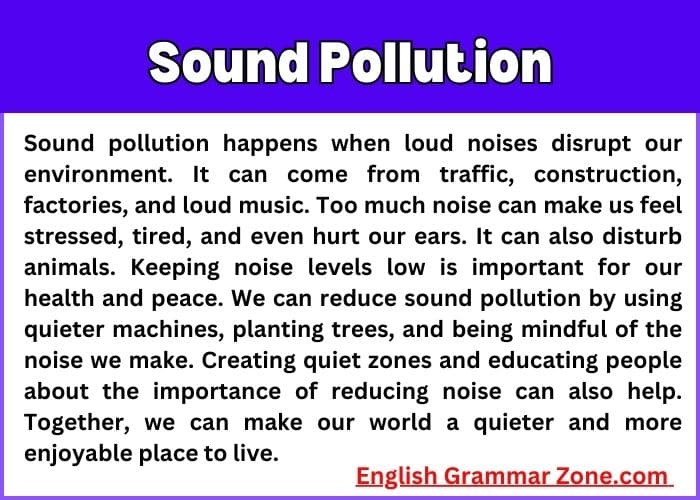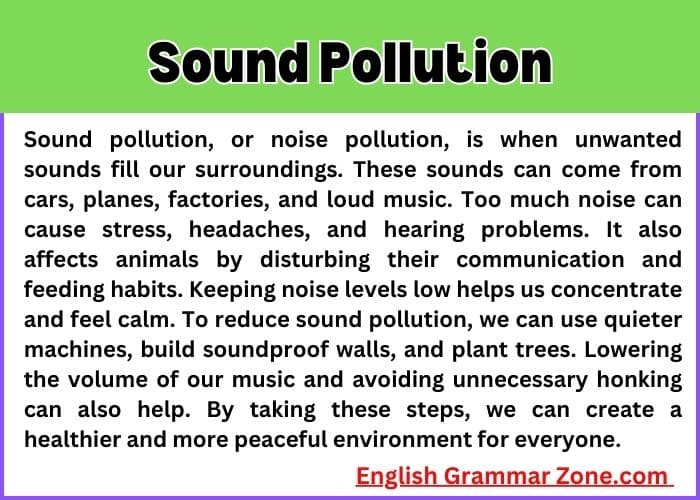Paragraph on Sound Pollution: Once upon a time, in a quiet town, there lived a boy named Max. Max loved to play outside and listen to the birds sing. But one day, construction workers started building a big mall nearby. The loud noises from the machines made it hard for Max to enjoy his day. He asked his mom why it was so noisy. She told him it was called sound pollution. In this article, we will learn how to write a paragraph on “Sound Pollution” (100, 150, 200, 250, 300 words). Now, get ready for a fun ride!
Paragraph on Sound Pollution – 100 words
Sound pollution is when there are loud and unwanted noises around us. These noises can come from cars, airplanes, factories, and even loud music. Too much noise can make us feel tired, stressed, and can even hurt our ears. It is important to keep noise levels low so we can concentrate and stay healthy. To reduce sound pollution, we can use quieter machines, plant trees to block noise, and wear earplugs if it is very loud. By doing these things, we can make our world a quieter and more peaceful place.

Paragraph on Sound Pollution – 150 words
Sound pollution happens when loud noises disturb our environment. These noises can come from traffic, construction sites, airplanes, and even loudspeakers at events. Too much noise can make us feel anxious, tired, and can even damage our hearing. It can also disturb animals and make it hard for them to find food or communicate.
Keeping noise levels low is important for our health and well-being. We can reduce sound pollution by using quieter appliances, building soundproof walls, and planting trees and shrubs to act as noise barriers. We can also lower the volume on our music devices and be mindful of how much noise we make at home or in public places. By taking these steps, we can help create a more peaceful and healthy environment for everyone.
Paragraph on Sound Pollution – 200 words
Sound pollution, also known as noise pollution, is when loud and disturbing sounds fill our surroundings. These sounds can come from various sources like busy roads, factories, airplanes, and even loud music from concerts or parties. When there is too much noise, it can affect our health by making us feel stressed, tired, and even causing hearing problems. It can also disturb animals, making it hard for them to find food and communicate with each other.
Keeping noise levels low is very important. When our environment is quieter, it helps us concentrate better, feel calmer, and sleep well. To reduce sound pollution, we can use quieter machines, plant more trees which can block noise, and create quiet zones in cities. We should also be careful about the noise we make at home and in public places, like keeping music at a reasonable volume and not honking car horns unnecessarily. By working together to keep our surroundings quieter, we can make our world a healthier and happier place to live.
Paragraph on Sound Pollution – 250 words
Sound pollution is a type of pollution where unwanted and harmful sounds disrupt our environment. These loud noises can come from many places such as heavy traffic, construction sites, factories, airplanes, and even loud music from concerts or our own homes. When there is too much noise around us, it can cause various health problems. People might feel stressed, have trouble sleeping, and even suffer from hearing loss. Animals are also affected by noise pollution, as it can interfere with their ability to communicate, find food, and avoid predators.
It is crucial to keep noise levels low to ensure a healthy and peaceful environment. Lower noise levels help us focus better, reduce stress, and improve our overall well-being. To reduce sound pollution, we can take several steps. For instance, using quieter technology and machinery, building soundproof structures, and planting trees and shrubs which can act as natural sound barriers. We can also be mindful of our noise levels at home and in public, such as by turning down the volume of our music and avoiding unnecessary honking.
Creating quiet zones in cities and educating people about the importance of noise reduction can also help. By taking these measures, we can significantly reduce sound pollution and create a more pleasant environment for everyone, including animals.
Paragraph on Sound Pollution – 300 words
Sound pollution, also known as noise pollution, occurs when unwanted or harmful sounds invade our environment. These loud noises can originate from various sources, such as busy highways, airports, industrial activities, construction sites, and even loud music from parties or events. Excessive noise can have several negative effects on both humans and animals. For humans, it can lead to stress, headaches, sleep disturbances, and hearing loss. Animals, too, suffer from noise pollution as it disrupts their communication, navigation, and feeding patterns.
Maintaining low noise levels is essential for a healthier and more peaceful environment. Quiet surroundings help us concentrate better, reduce stress, and improve our overall health. To combat sound pollution, we can take several proactive measures. Using quieter machinery and technology is one effective way. Additionally, constructing soundproof buildings and barriers can significantly block out unwanted noise. Planting trees and shrubs along roads and in urban areas can also serve as natural sound buffers.
On a personal level, being mindful of the noise we create is crucial. Lowering the volume of our devices, avoiding unnecessary use of car horns, and respecting quiet hours in residential areas can make a big difference. Governments and communities can work together to create quiet zones in cities and enforce noise regulations to keep the environment serene.
Educating the public about the harmful effects of noise pollution and how to reduce it can also play a significant role. By implementing these strategies, we can significantly minimize sound pollution, creating a more pleasant and healthy environment for everyone. Together, we can make our world a quieter and more enjoyable place to live.

FAQs About Paragraph on Sound Pollution
What is sound pollution and where does it come from? Sound pollution, also known as noise pollution, is when unwanted or harmful sounds disrupt our environment. These sounds can come from traffic, airplanes, factories, construction sites, and loud music. Sound pollution can be very disturbing and affect our health and well-being. It is important to recognize the sources of sound pollution so we can find ways to reduce it.
How does too much noise affect our health?
Too much noise can cause a variety of health problems. It can make us feel stressed, give us headaches, and disturb our sleep. Long-term exposure to loud noises can even cause hearing loss. Noise pollution can also affect our ability to concentrate and make it harder to relax. By reducing noise pollution, we can improve our overall health and quality of life.
Why is it important to keep noise levels low?
Keeping noise levels low is important for our health and well-being. When our environment is quiet, it helps us concentrate better, reduces stress, and allows us to sleep more peacefully. Low noise levels also create a more pleasant and enjoyable atmosphere for everyone. By keeping noise levels low, we can improve our quality of life and create a more peaceful environment.
What are some ways to reduce sound pollution?
There are several ways to reduce sound pollution. We can use quieter machines and technology, build soundproof walls and barriers, and plant trees to block out noise. On a personal level, we can lower the volume of our music, avoid unnecessary honking, and be mindful of the noise we make at home. Communities can also create quiet zones and enforce noise regulations to keep the environment peaceful.
How does sound pollution affect animals?
Sound pollution can be very harmful to animals. It can interfere with their communication, making it harder for them to find mates and warn each other of danger. Loud noises can also disrupt their feeding and navigation habits. By reducing sound pollution, we can help protect wildlife and create a healthier environment for all living creatures.
Popular Quotes on “Sound Pollution”
“Noise is the most impertinent of all forms of interruption.” – Arthur Schopenhauer
“Silence is not the absence of sound, but the presence of peace.” – Anonymous
“The quieter you become, the more you can hear.” – Ram Dass
“Nature’s music is never over; her silences are pauses, not conclusions.” – Mary Webb
“A quiet environment is a necessary foundation for a peaceful mind.” – Dalai Lama
“Noise: a stench in the ear.” – Ambrose Bierce
“Silence is a source of great strength.” – Lao Tzu
Summary 1. Paragraph on Sound Pollution
Sound pollution happens when loud noises disrupt our environment. It can come from traffic, construction, factories, and loud music. Too much noise can make us feel stressed, tired, and even hurt our ears. It can also disturb animals. Keeping noise levels low is important for our health and peace. We can reduce sound pollution by using quieter machines, planting trees, and being mindful of the noise we make. Creating quiet zones and educating people about the importance of reducing noise can also help. Together, we can make our world a quieter and more enjoyable place to live.
Summary 2. Paragraph on Sound Pollution
Sound pollution, or noise pollution, is when unwanted sounds fill our surroundings. These sounds can come from cars, planes, factories, and loud music. Too much noise can cause stress, headaches, and hearing problems. It also affects animals by disturbing their communication and feeding habits. Keeping noise levels low helps us concentrate and feel calm. To reduce sound pollution, we can use quieter machines, build soundproof walls, and plant trees. Lowering the volume of our music and avoiding unnecessary honking can also help. By taking these steps, we can create a healthier and more peaceful environment for everyone.

